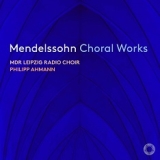Der MDR Rundfunkchor gehört zu den Top-Ensembles der Branche. Das untermauern Philipp Ahmann und seine Sänger wiederum in ihrer neuen Produktion mit späten Werken aus Felix Mendelssohn Bartholdys geistlichem Schaffen.
Über den homogenen, wohl tarierten Chorklang wollen wir hier nicht reden. Er ist nahezu eine Selbstverständlichkeit.
Zu sprechen gilt es allerdings über die Ausdruckskraft des Vortrages, über die rhetorische Stärke, die Philipp Ahmann und sein Ensemble an den Tag legen.
Gerade in der protestantischen Liturgie kommt dem Wort eine besondere Bedeutung zu. Das Wort bleibt jedoch eine leere Hülle, wenn es nicht gestaltet, im gesamten Textumfeld seine wahre Bedeutung bekommt. Hier kommt der MDR Rundfunkchor ins Spiel, der aus Wort und Musik, aus Text und Klang eine symbiotische Einheit bildet.
Philipp Ahmann kann dabei aus dem vollen sängerischen Potenzial seiner Choristen schöpfen, sie in kleiner Besetzung quasi solistisch einsetzen, wie natürlich im ganzen Ensemble. Dem Klang tut das keinen Abbruch und damit auch nie der Dramaturgie des Textes.
Jedes Werk wird hier musikalisch und inhaltlich geformt, wird gelebt und kommuniziert. Als Beispiel sei der zweite Psalm ‘Warum toben die Heiden’ genannt, wo es in der Mitte des Textes recht robust zur Sache geht (… du sollst sie mit eisernem Zepter zerschlagen…). Diese Passage lässt Philipp Ahmann sehr kantig, aufgewühlt vortragen. Der Psalm endet dann versöhnlich (… küsset den Sohn, dass er nicht zürne…). Dementsprechend wird der Text wesentlich anmutiger gestaltet, er strahlt Zuversicht aus.
Es sind eben diese nuancierten Stimmungsbilder, das intuitive Textverständnis, gekoppelt mit höchster musikalischer Stilsicherheit, die – um Chorleiter Philipp Ahmann aus einem MDR-Interview zu paraphrasieren – Texte zum Klingen bringen und zum Innehalten anregen.
The MDR Rundfunkchor is one of the top ensembles in the business. Philipp Ahmann and his singers underline this once again in their new production with late works from Felix Mendelssohn Bartholdy’s sacred oeuvre.
We do not want to talk about the homogeneous, well-tared choral sound here. It is almost a matter of course.
We do, however, want to talk about the expressiveness of the performance, about the rhetorical strength that Philipp Ahmann and his ensemble display.
Especially in the Protestant liturgy the word has a special meaning. However, the word remains an empty shell if it is not shaped, given its true meaning in the overall textual setting. This is where the MDR Rundfunkchor comes into play, creating a symbiotic unity from word and music, from text and sound.
Philipp Ahmann is able to draw on the full vocal potential of his choristers, using them quasi-soloistically in small ensembles as well as, of course, in the whole ensemble. This does not detract from the sound and thus never from the dramaturgy of the text.
Each work is shaped here musically and in terms of content, is lived and communicated. As an example, the second psalm Warum raben die Heiden (Why do the heathen rage) is mentioned, where the middle of the text is quite robust (… you shall smite them with a scepter of iron…). Philipp Ahmann delivers this passage in a very edgy, agitated manner. The psalm then ends conciliatory (… kiss the Son, that he not be angry…). Accordingly, the text is rendered much more gracefully, radiating confidence.
It is precisely these nuanced moods, the intuitive understanding of the text, coupled with the highest musical stylistic confidence, which – to paraphrase choirmaster Philipp Ahmann from an MDR interview – make texts resound and inspire us to pause.
























